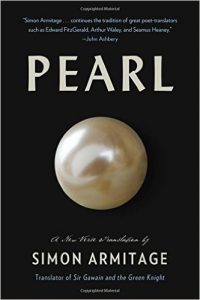 Simon Armitage’s Pearl is the winner of the 2017 PEN Award for Poetry in Translation. The following is an excerpt from the collection of Medieval English poems—first in translation, followed by the original language.
Simon Armitage’s Pearl is the winner of the 2017 PEN Award for Poetry in Translation. The following is an excerpt from the collection of Medieval English poems—first in translation, followed by the original language.
Submissions and nominations for the 2018 PEN Literary Awards are now open and will be accepted through August 15, 2017.
Translation of the original fourteenth-century manuscript:
1
Beautiful pearl that would please a prince,
fit to be mounted in finest gold,
I say for certain that in all the East
her precious equal I never found.
So radiant and round, however revealed,
so small, her skin so very smooth,
of all the gems I judged and prized
I set her apart, unparalleled.
But I lost my pearl in a garden of herbs; 1
of all the gems I judged and prized I set her apart, unparalleled.
she slipped from me through grass to ground,
and I mourn now, with a broken heart, 2
for that priceless pearl without a spot. 3
2
And in that spot where it sprang from me
I’ve often watched, wishing for the one
that drove away sorrow, lightened my load,
roused my spirits and rallied my health.
Loss and longing lean on my heart
and my breast burns with the heat of the hurt;
yet no song was ever as sweetly sung
as the silent moments that stole me away
on the many occasions she came to mind.
To think of her color, now clad in clods . . .
oh black soil, you blot and spoil
my precious pearl without a spot.
3
Spices must thrive and spread in that spot
where rot and ruin enrich the soil;
blooms of white and blue and red turn shining faces toward the sun.
Flower and fruit could never fade where my pearl entered the dark earth;
grasses must grow from lifeless grains 4
or wheat would never be brought to the barn.
For goodness out of goodness is born,
and such a seed couldn’t fail to root
nor splendid spices sprout and shoot
from that precious pearl without a spot.
4
I went to the spot my words describe,
in the month of August on holy day,
when corn succumbs to the sharpened scythe.
That pearl had rolled away from a mound where brightly lit plants cast bold shadows:
ginger, gromwell and gillyflower with peonies scattered in between—
such a sweet scene for the eye to see, made fairer by fragrances floating up . . .
I believe and know where that lovely one lives, my precious pearl without a spot.
5
In that same spot I clasped my hands,
wholly overcome by the coldness of sorrow.
A desolating grief had gripped my heart when reason could have put my mind at rest.
I pined for my pearl in its earthen prison and fierce thoughts fought back and forth;
though the nature of Christ offered me comfort
my wretched desire writhed in despair.
Among those flowers I fell to the floor,
my senses suddenly swamped by scent,
and sank into heavy sleep on the ground where my pearl was lost, on the same spot.
Original fourteenth-century manuscript:
1
Perle plesaunte to Prynces paye,
To clanly clos in golde so clere!
Oute of Oryent, I hardyly saye, Ne proved I never her precios pere,
So rounde, so reken in uche araye, So smal, so smothe her sydez were.
Queresoever I jugged gemmez gaye,
I sette hyr sengeley in syngulere.
Allas! I leste hyr in on erbere;
Thurgh gresse to grounde hit fro me yot.
I dewyne, fordolked, of luf-daungere, Of that pryvy perle wythouten spot.
2
Sythen in that spote hit fro me sprange,
Ofte haf I wayted, wyschande that wele
That wont watz whyle devoyde my wrange,
& heven my happe & al my hele, That dotz bot thrych my hert thrange,
My breste in bale bot bolne & bele.
Yet thoght me never so swete a sange As stylle stounde let to me stele;
Forsothe ther fleten to me fele,
To thenke hir color so clad in clot.
O moul, thou marrez a myry juele, My privy perle wythouten spotte!
3
That spot of spysez mot nedez sprede,
Ther such rychez to rot is runne;
Blomez blayke & bluwe & rede Ther schynez ful schyr agayn the sunne;
Flor & fryte may not be fede Ther hit doun drof in moldez dunne;
For uch gresse mot grow of graynez dede,
No whete were ellez to wonez wonne;
Of goud uche goude is ay bygonne;
So semly a sede moght fayly not,
That spryngande spycez up ne sponne
Of that precios perle wythouten spotte.
4
To that spot that I in speche expoun
I entred, in that erber grene,
In Augoste in a hygh seysoun,
Quen corne is corven wyth crokez kene.
On huyle ther perle hit trendeled doun Schadowed this wortez ful schyre & schene—
Gilofre, gyngure, & gromylyoun,
& pyonys powdered ay bytwene.
Yif hit watz semly on to sene,
A fayr reflayr yet fro hit flot,
Ther wonys that worthyly, I wot & wene,
My precious perle wythouten spot.
5
Bifore that spot my honde I spenned
For care ful colde that to me caght;
A devely dele in my hert denned,
Thagh resoun sette myseluen saght.
I playned my perle that ther watz spenned
Wyth fyrte skyllez that faste faght;
Thagh kynde of Kryst me comfort kenned,
My wreched wylle in wo ay wraghte.
I felle upon that floury flaght,
Suche odour to my hernez schot;
I slode upon a slepyng-slaghte—
On that precios perle wythouten spot.
Footnotes:
1. Song of Solomon 4:12: “My sister, my spouse, is a garden enclosed, a garden enclosed, a fountain sealed up.”
2. Song of Solomon 2:5: “Stay me up with flowers, compass me about with apples: because I languish with love.”
3. Revelation 14:5: “And in their mouth there was found no lie; for they are without spot before the throne of God.”
4. John 12:24–25: “Amen, amen I say to you, unless the grain of wheat falling into the ground die, itself remaineth alone. But if it die, it bringeth forth much fruit. He that loveth his life shall lose it; and he that hateth his life in this world, keepeth it unto life eternal.”
This is an excerpt from Simon Armitage’s translated prose of the Medieval English masterpiece Pearl, published by Liveright Publishing Corporation, a division of W. W. Norton & Company in 2016.











